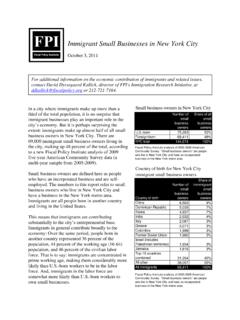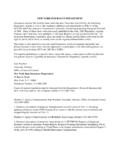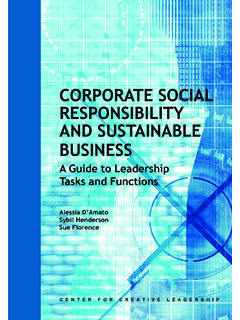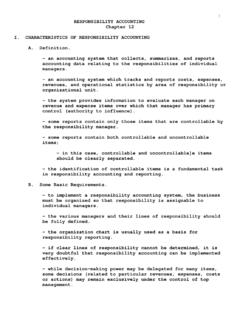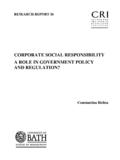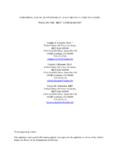Transcription of I S B USINESS OWNERS - Fiscal Policy Institute
1 IMMIGRANT SMALL business OWNERS A SIGNIFICANT AND GROWING PART OF THE ECONOMY A REPORT FROM THE Fiscal Policy Institute S IMMIGRATION RESEARCH INITIATIVE JUNE, 2012 Immigrant Small business OwnersJune 2012 Core support for the Fiscal Policy Institute s Immigration Research Initiative is provided by the Carnegie Corporation of New statements made and views expressed are solely the responsibility of the Fiscal Policy principal author of Immigrant Small Busi-ness OWNERS is David Dyssegaard Kallick, se-nior fellow of the Fiscal Policy Institute (FPI) and director of FPI s Immigration Research Initiative. James Parrott, FPI s chief economist and deputy director, provided constant support and research guidance.
2 The report was pre-pared under the oversight of Frank Mauro, the Fiscal Policy Institute s executive director, who gave particularly valuable input on property tax issues. Research associate Jonathan De-Busk conducted extensive data analysis for the report and gave valuable input on the findings. Carolyn Boldiston, senior Fiscal Policy analyst, and Jo Brill, FPI s communications director, gave helpful feedback throughout the research Immigration Research Initiative gratefully acknowledges the guidance of its expert advi-sory panel, which is listed in full on the final page of this thanks are also due to the dedicated staff of the Census Bureau and the Bureau of Labor Statistics.
3 Table of ContentsAcknowledgmentsExecutive Summary .. 1 Introduction .. 51. Small Businesses .. 62. Small business OWNERS .. 8 Conclusion .. 26 Appendix A .. 27 Definitions and data sources for immigrant small business ownersAppendix B .. 29 Full broad and detailed industries for immigrant small business ownersAppendix C .. 31 Broad and detailed industries by race/ethnicity of immigrants and by gender of and foreign-bornExpert Advisory Panel for FPI s Immigrant Research Initiative .. 32 Immigrant Small business OwnersFPI June 2012 1 Executive SummaryImmigrant entrepreneurship is widely recog-nized as an important aspect of the economic role immigrants play. Surprisingly, until now, there has been relatively little basic informa-tion available about the number and character-istics of immigrant small business report breaks new ground in identifying small immigrant businesses and immigrant small business OWNERS .
4 It gives a detailed profile of who immigrant business OWNERS are, based primarily on two data sources: the Survey of business OWNERS (SBO), looking at businesses with between 1 and 99 employees; and the American Community Survey (ACS), looking at people who own an incorporated business and whose main job is running that business . Immigrant-owned small businesses: million employees, $776 billion in receiptsSmall businesses firms with at least one and fewer than 100 people working for them employed 35 million people in 2007, accord-ing to the most recent SBO, accounting for 30 percent of all private-sector these small businesses, firms for which half or more of the OWNERS are immigrants employed an estimated million people, 14 percent of all people employed by small business OWNERS .
5 These firms generated an esti-mated total of $776 billion in receipts in 2007, the most recent year for which these data are percent of small business OWNERS in the United States are immigrantsLooking at small business OWNERS rather than small businesses, we can see that there are 900,000 immigrant small business OWNERS in the United States, 18 percent of the mil-lion small business OWNERS overall. These data come from the 2010 ACS, where we define business OWNERS as people who own an incor-porated business and whose main job is to run that business . The immigrant share of small business own-ers, at 18 percent, is higher than the immigrant share of the overall population (13 percent) and the immigrant share of the labor force (16 percent).
6 More than half 57 percent of these small businesses have at least one paid employee in addition to the owner , the same share for both and foreign-born business OWNERS . And, of those with employees, the average number of employees is ( for immigrants, for ).*More immigrant business OWNERS in professional and business services than in any other sectorThe largest number of immigrant business OWNERS are in the professional and business services sector (141,000 business OWNERS ), followed by retail (121,000), construc-tion (121,000), educational and social ser-vices (100,000), and leisure and hospitality (100,000).Within the broad sectors, the types of small businesses most commonly owned by immi-grant business OWNERS are restaurants, physi-cian s offices, real estate firms, grocery stores, and truck transportation services.
7 * Number of small business OWNERS and the 1990 to 2010 trend are based on the 2010 ACS 1-year estimate. All other ACS data are from an ACS 2010 5-year esti-mates which includes data from the years 2006-10 to allow for greater detail. Share of people who own an incorporated business and are self-employed, as well as average number of employees, are from CPS Contingent Work Supplement (2005).2 FPI June 2012 Immigrant Small business OwnersImmigrants are also playing a disproportion-ate role in some industries. The sector where immigrants make up the biggest share of small business OWNERS is leisure and hospitality. Im-migrants represent 28 percent of small busi-ness OWNERS in leisure and hospitality.
8 Within leisure and hospitality, immigrants make up 43 percent of hotel and motel OWNERS , and 37 percent of restaurant types of businesses where immigrants are strongly overrepresented include taxi service firms (65 percent of OWNERS are immi-grants), dry cleaning and laundry services (54 percent), gas station OWNERS (53 percent), and grocery store OWNERS (49 percent). Interest-ingly, immigrants are underrepresented among construction business OWNERS , though they are highly overrepresented among construction are more likely to be business OWNERS , but their businesses tend to be smallerIn all, immigrant small business OWNERS had $63 billion in annual personal income, accord-ing to the ACS 5-year estimate, 15 percent of the $419 billion in personal earnings from small businesses overall (in wage and salary plus proprietor s earnings).
9 Immigrant business OWNERS tend to have smaller businesses than OWNERS , as indicated by a smaller share of earnings than of the number of busi-ness percent of recent small business growth is due to immigrants Over the past two decades, between 1990 and 2010, the number of small business OWNERS grew by million, from to million. Immigrants made up 30 percent of that growth, as the immigrant share of small business OWNERS kept in step with the increasing im-migrant share of the labor force. As a result, there were 539,000 more immigrant small business OWNERS in 2010 than in 1990. In the Great Recession, both and foreign-born small business OWNERS suffered, but there is some indication that the number of small busi-ness OWNERS is gradually beginning to increase make up biggest number of business OWNERS , while immigrants from Middle East, Asia, and Southern Europe playing a dispro-portionate roleMexican immigrants are less likely than other groups to be small business OWNERS , perhaps in part because a high share of Mexican immi-grants are not legally authorized to work in the United States.
10 Yet there are nonetheless more small business OWNERS from Mexico than from any other sin-gle country. This is no surprise, perhaps, given the size of the Mexican population, though this does not seem to be the common image of immigrant small business OWNERS . Immigrants born in Mexico make up 12 percent of im-migrant small business OWNERS , followed by immigrants born in India, Korea, Cuba, China, and Vietnam. Immigrants from some countries including some with relatively small numbers in the overall population are disproportionately likely to be business OWNERS . Immigrants from the Middle East, Asia, and Southern Europe are particularly inclined toward business own-ership. Immigrants from Greece, for example, are a tiny fraction of all immigrants in the la-bor force, but 16 percent of Greek immigrants in the labor force are business OWNERS the highest share of any group.
